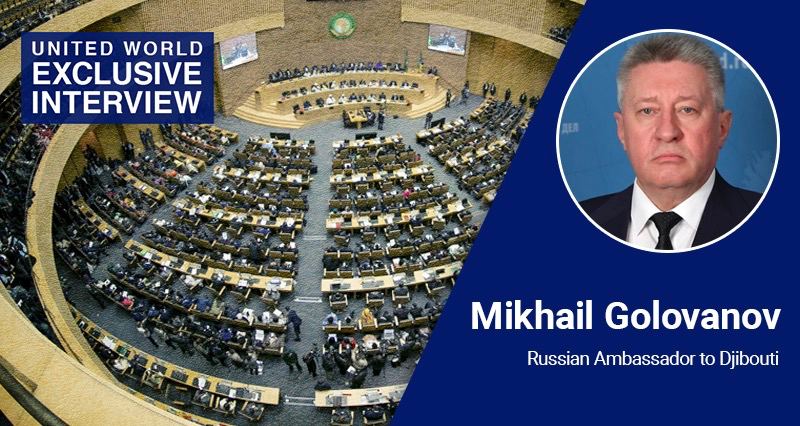Russia’s Ambassador to Djibouti wrote exclusively for UWI.
Russia’s Ambassador to Djibouti wrote exclusively for UWI.
By Mikhail Golovanov, Russian Ambassador to Djibouti
Mikhail Golovanov is a Russian diplomat, an expert in international and especially African issues. Since 2019, he has been serving as the Russian ambassador to Djibouti, a unique country considering to be ‘the gates to East Africa’. Exclusively for UWI, Mr. Golovanov wrote an essay on the upcoming elections of the African Union Commission Chairperson.
On February 15, 2025, the African Union (AU) Summit in Addis Ababa will elect a new Chairperson of the AU Commission, the head responsible for guiding this pan-African body.
The AU is the successor to the Organization of African Unity (OAU), an association of African states founded in 1963 to defend their sovereignty and to eradicate colonialism and apartheid. However, at the end of the 20th century, the international environment changed and new political and economic challenges emerged. The African leaders concluded this organization to be rethought. Thus, on July 11, 2000, the OAU Summit in Lomé (Togo) adopted a founding act that defined the goals and structure of the modern African Union — thereby, the OAU was transformed into the AU, which began its work on July 9, 2002.
The association includes all the states of the continent, but currently suspends the membership of Guinea (from September 2021), Mali (from June 2021), Sudan (from October 2021), Burkina Faso (from January 2022), Niger (from August 2023), and Gabon (from August 2023) — due to military coups in these countries; although many commentators believe the rise to power of new anti-Western rulers in at least some of them has contributed to the rise of African sovereignty.
But back to my article.
It is known that structurally, the African Union consists of an Assembly, an Executive Council, and an AU Commission.
In the upcoming elections of the Chairmanship of the AU Commission, three candidates will participate: former Kenyan Prime Minister Raila Odinga, Madagascar Foreign Minister Richard Randriamandrato, and the current Minister of Foreign Affairs and International Cooperation of Djibouti Mahmoud Ali Yusuf.
All three are worthy representatives of Africa who have done much for their home countries and for the continent as a whole.
However, I will allow myself to elaborate on the keynote address by the Foreign Minister of the Republic of Djibouti, since I have been accredited to that East African State for more than five years and have been following the developments there and in the Horn of Africa with great attention.
In a recent interview with Djibouti Radio and Television, Mr. Youssouf shared his vision for Africa. It is based on a key AU initiative called Silencing Guns by 2030. According to the Minister, the continent’s stability and prosperity can be achieved through peace and security.
‘Peace and security are the basement on which Africa must build its future,’ he said. This should be agreed upon when looking at the conflicts currently unfolding in the Sahel, East Africa, the Great Lakes region, and other parts of the continent.
At this point, the Djiboutian candidate goes on, security would ensure Africa’s sustainable development. For this to happen, he said, countries need to agree on a common approach in various areas, including the economy, environment, and infrastructure. Here, Mr. Yusuf touched on ambitious projects such as the construction of the Grand Inga hydroelectric power plant (DRC) and cross-border high-speed railroads that would connect African capitals. He also suggested accelerating the launch of the African Continental Free Trade Area, a project seen as an engine for the continent’s economic transformation.
In addition, the Djiboutian Minister highlighted the agenda of combating climate change, cybersecurity, and digital governance. ‘Threats are evolving, and we must be prepared to take on the challenges of the 21st century,’ he explained. Moving on, the diplomat called for the creation of a Pan-African Cybersecurity Agency that would work in collaboration with national services to protect critical digital infrastructure and personal data of African citizens. Technology was also highlighted as a key tool that will improve the efficiency of public services and provide African youth with greater opportunities for self-realization.
It should be emphasized here that experts predict that by 2050, one third of the world’s youth will live in Africa, and 45% by 2100. These figures demonstrate the significant role that young Africans are playing and will continue to play in the global economy.
Summarizing, regardless of the outcome of the upcoming elections, the AU is entering its new important stage. The African continent is a distinctive and influential center of global development. Therefore, I am confident that Russia, which has gained the observer status at the AU since 2006, will continue to improve comprehensive and multifaceted ties with African states in order to bring our relations to a higher and better level.

















Leave a Reply